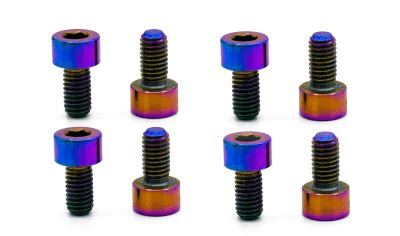What Is a Titanium Bolt?

As the name suggests, a titanium bolt is a bolt made of the metal “titanium.”
Titanium is characterized by its extremely high strength compared to its small mass and is used in a wide variety of parts for industrial and medical applications. It also has excellent corrosion and heat resistance, making it suitable for use in situations where conventional bolts cannot be used or need to be replaced frequently.
On the other hand, titanium is prone to react with other elements in high-temperature environments, making it costly to manufacture.
Uses of Titanium Bolts
Taking advantage of their high strength despite their light weight, titanium bolts are used in a variety of industrial products. Among them, they are most often used for aircraft parts. In this case, an alloy of titanium mixed with other elements is used so that strength is maintained even under high temperatures.
Next, because of its high corrosion resistance, titanium is also used for items that are exposed to rain, wind, and seawater. Examples include road signs and facilities located at sea. Since ordinary steel screws may rust quickly, titanium bolts are suitable.
Taking advantage of the fact that they do not cause allergic reactions even when implanted in the human body, they are also used in the medical field. Specifically, they are used in dental treatment and as fixing bolts for bone fractures.
Titanium bolts are also used in hobby and sports applications, as well as in radio-controlled vehicles and sports bicycles for the purpose of weight reduction.
Principle of Titanium Bolts
The principle of a titanium bolt that serves as a bolt is the same as that of a bolt made of other materials. The bolt is pulled by the principle of lifting a heavy load using a spiral slope, and its elastic force is used as the fastening force. The bolt does not loosen because the frictional force of the bolt surface prevents the heavy load from sliding down the slope.
Titanium bolts have the following excellent properties in particular. Titanium bolts are used in areas where these properties can be utilized.
1. High Strength for LightWeight
The greatest feature of titanium bolts is that they are strong for their light weight. Compared to steel, which is a familiar material, titanium bolts are approximately 60% lighter but twice as strong and can be used in industrial machinery that is subjected to strong loads.
2. Excellent Corrosion Resistance
Titanium also has excellent corrosion resistance. Titanium oxide is formed on the surface of titanium exposed to air. This becomes passive, preventing the internal titanium from oxidizing and rusting. It is also highly resistant to oxidizing acids such as nitric acid and chloride water ions such as seawater, making it suitable for use in equipment and offshore facilities that use strong acids.
3. High Safety
Titanium is also known as a highly safe metal. Since it does not cause metal allergies, it can be used for medical purposes, such as bolts to fix fractured bones and dental implants. Pure titanium is not prone to metal allergies, but in the case of titanium alloys, allergy safety varies depending on the metal mixed with the titanium alloy, so care must be taken.
Types of Titanium Bolts
Titanium bolts can be classified into two types according to the way the threads are made: machined threads and rolled threads.
1. Cutting Thread
Cutting threads are made by shaving a rough round bar with a cutting tool to create a thread shape. In the case of titanium bolts, pure titanium (Ti2), which is relatively easy to machine, is used as the material. Pure titanium is not as strong as α+β titanium or β titanium, which are designed to increase strength.
2. Thread Rolling
In contrast to machined threads, threads are formed by pressing and rotating a rolling die, a die with the shape of the product inverted, onto a round bar of rough material. No chips are generated, as in the case of cutting, and high strength can be obtained due to the connected structure of the metallic material. However, rolling dies are expensive, and costs are likely to be higher for low-volume production.
Other Information on Titanium Bolts
Differences in Titanium Materials
Generally speaking, there are many different types of materials when it comes to titanium products. The two main types are pure titanium and titanium alloys.
Pure titanium can be further classified into pure titanium class 1 (Ti1) and pure titanium class 2 (Ti2). Pure titanium is less likely to cause metal allergies. Titanium alloys that intentionally contain other metals are not necessarily less likely to cause metal allergies.
Titanium alloys can be further divided into three types. Titanium alloys can be further divided into three types: α+β titanium alloys and β titanium alloys for increased strength, titanium-palladium alloys for corrosion resistance, and titanium-nickel alloys used as shape memory.